Kay Ivey wants to see Alabamians become safer drivers

Gov. Kay Ivey wants to see Alabamians become safer drivers. That’s why she’s awarded a $2.8 million grant to the University of Alabama and Auburn University, who are putting their gridiron rivalries aside to team up to help Alabamians become safer drivers. The two universities, along with the Alabama Department of Public Health (ADPH), are gathering traffic safety data and converting it into messages to encourage Alabama drivers to use seat belts and child restraint seats, do not drink and drive or drive while distracted and obey traffic safety laws. “Regardless of your allegiance, when two of our larger universities work collaboratively to save lives and prevent injuries on our highways, our entire state wins,” Ivey said. “I am very grateful for the efforts of these universities along with the Department of Public Health to bring greater awareness to traffic safety. My administration remains committed to keeping drivers safe on our roadways, and I am proud to offer my support to this project.” The University of Alabama’s Center for Advanced Public Safety provides data to determine where crashes are occurring and the causes. The information, much of it collected by ADPH, also examines factors such as seat belt use, distracted driving and sobriety. Law enforcement agencies use that information to increase patrols and monitor traffic in high-crash zones. Auburn University’s Media Production Group produces outreach and awareness campaigns geared toward safe driving. Many of those promotions are tied to national highway safety campaigns like “Click it or Ticket” seatbelt enforcement or “Drive Sober or Get Pulled Over” impairment crackdown and are conducted around major holidays, like Labor Day, when more people are likely to be travelling. The Alabama Department of Economic and Community Affairs (ADECA) is administering the grants from funds made available to the state by the National Highway Traffic Safety Administration. “These efforts along with increased law enforcement presence send a clear signal that dangerous drivers are not tolerated on Alabama’s roads,” ADECA Director Kenneth Boswell. “ADECA is pleased to join Gov. Ivey in supporting the efforts of these institutions to increase highway safety.” Gov. Ivey notified Cynthia Hope, UA director of sponsored programs, John M. Mason, AU vice president for Research and Economic Development and Dr. Scott Harris, state Health Officer, that the grants had been approved.
Kay Ivey proclaims Aug. 31 as College Colors Day in Alabama
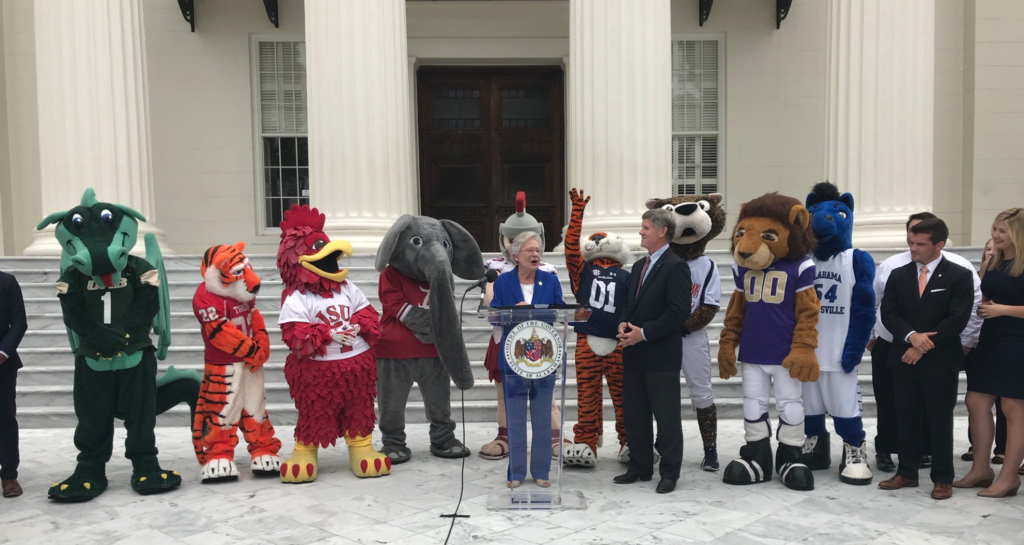
College Colors Day is an annual celebration dedicated to promoting the traditions and spirit that make the college experience great. Celebrated annually the Friday before Labor Day, Gov. Kay Ivey proclaimed Alabama will participate in the national event August 31 on the steps of the state capitol on Friday. She was joined by school representatives and mascots from Alabama’s 14 public universities and colleges to promote the upcoming day and encouraged all Alabamians to wear their favorite school’s colors. “In partnership with @ALHigherEd, I’m very proud to proclaim August 31 as College Colors Day in Alabama. I encourage everyone to participate in this annual tradition & proudly wear your favorite college colors to support our 14 public universities!” Ivey tweeted Friday morning. Check out more pictures from Friday’s announcement:
2018 statewide election ad roundup: August 24 edition

The November 6 general election is less than 80 days away and Alabama’s candidates have taken to the internet and the airwaves with campaign ads in hopes of swaying Yellowhammer State voters to their side. This week, only Democratic gubernatorial candidate Walt Maddox released a new ad. Maddox has called Governor Kay Ivey to debate him several times, and each time she’s dismissed his proposals saying; “When he finishes debating himself he can talk.” In response, Maddox has released a series of ads where an invisible announcer addresses an empty debate podium labelled “Kay Ivey,” asking the podium a series of questions. The empty podium never answers; leaving the announcer to ask “Governor Ivey? Governor?” Maddox then responds to the question himself, securing his positions on issues from his pro-life stance, to Supreme Court nominee Brett Kavanaugh‘s confirmation. This week Maddox addresses a series of topics including corruption and ethics laws, former Chief Justice Roy Moore‘s misconduct, and infrastructure. Gubernatorial ads Democrat Walt Maddox: Title: Debate Topic #3: Corruption and Ethics Laws Published: August 16, 2018 Tone: Scornful Title: Debate Topic #4: Roy Moore’s Misconduct Published: August 21, 2018 Tone: Optimistic Title: Debate Topic #5: Roads, Bridges and other Infrastructure Published: August 23, 2018 Tone: Outraged
Personnel Note: Jon Barganier leaving Kay Ivey staff to head Alabama Petroleum Council
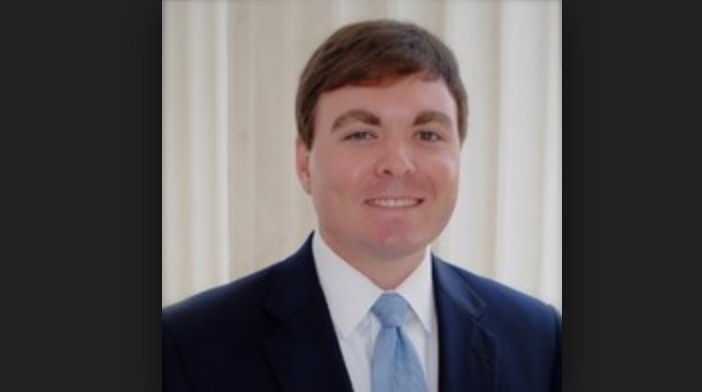
Governor Kay Ivey‘s Deputy Chief of Staff Jon Barganier is leaving his long-time post in Alabama’s capitol to serve as the Executive Director for the Alabama Petroleum Council. Barganier earned his undergraduate degree from the University of Alabama, majoring in Journalism, then attended Auburn University at Montgomery to earn an M.B.A. while working at the State Department of Finance. He has served in Montgomery since 2006, beginning his career as a state planning analyst and division manager of IT Operations at the Alabama Department of Finance. From there, he served as the Director of the Executive planning Office in the same department. After a brief one-year stint in the private sector he joined former Governor Robert Bentley‘s staff as a legislative liaison working his way through the ranks to become the deputy chief of staff, and finally Bentley’s chief of staff, according to his LinkedIn profile. He’s since served as Ivey’s deputy chief of staff for over a year; his resignation goes into effect August 31. According to Yellowhammer News, “the Alabama Petroleum Council is a division of the American Petroleum Institute and represents upstream (exploration and production) and downstream (refining, supply, marketing and transportation) interests and investments of major integrated oil and natural gas companies.”
Alabama, Birmingham preparing for economic impact of Opportunity Zones

A new national tax incentive program that some believe could be the most transformative economic development tool ever has communities in Alabama, led by Birmingham, preparing to cash in on its share of potentially trillions of dollars in new investment. Opportunity Zones are low-income census tracts with a poverty rate of at least 20 percent and a median family income of less than 80 percent of the statewide or area median income. The program was established as part of the Tax Cuts and Jobs Act of 2017 in hopes of spurring new investment into these areas. Alex Flachsbart is an attorney with Balch & Bingham and an expert on Opportunity Zones. He recently presented on the subject to members of the Economic Development Association of Alabama. “What it does is provides people with capital gains an incentive to put those gains back into low-income communities, to redeploy that capital to places that really need it,” he said. Alabama Gov. Kay Ivey tasked the Alabama Department of Economic and Community Affairs with choosing the 158 Opportunity Zones that Alabama would designate from the 629 eligible census tracts. The guidelines for Opportunity Zones are still being written, with the initial regulations expected this month and proposed regulations in place by year’s end. What is known is that those who have capital gains from the sale of everything from stocks to businesses can reinvest those gains into qualified projects within designated Opportunity Zones and receive tax deferral and reduction benefits over time. Birmingham and other cities want to be prepared when investors are ready to put capital gains into approved projects like startup businesses and real estate developments. Alabama has designated 158 census tracts as Opportunity Zones. (ADECA) The city is creating the Birmingham Inclusive Growth (BIG) Fund to attract investments in Opportunity Zones in the city. Josh Carpenter, director of innovation and economic opportunity, said Birmingham has to be ready now because it will be competing with cities across the country for those dollars. “We’re excited because Birmingham was able to secure 24 Opportunity Zones and also because we have a lot of investable assets here,” he said. Carpenter said the city is prepared to lead, direct and maximize investments in Opportunity Zones. He and Birmingham Mayor Randall Woodfin see the city’s role as not only increasing quality of life and economic growth in neighborhoods but in helping investors. Carpenter said areas like the Innovation District, the Civil Rights District and the Fourth Avenue Business District, as well as the area around the Birmingham-Shuttlesworth International Airport, all stand to initially benefit from Opportunity Zone investments. David Fleming, CEO of REV Birmingham, said he envisions communities in downtown Birmingham but also neighborhoods like Avondale, Woodlawn, East Lake and others benefiting. “I think the Opportunity Zone incentive that’s been created holds tremendous potential for Birmingham, especially since most of the city was able to be designated an Opportunity Zone,” he said. “That means that this is not just an incentive for downtown, but it’s an incentive that could encourage business investment as well as physical redevelopment in a wide range of the territory of the city.” Fleming said the best incentives help attract new capital, leverage private sector dollars and can be combined with incentives that a district or community has in place. “When you talk about the scope of the market for Opportunity Zones, you’re talking about the potential for $6.1 trillion worth of capital gains that could be flowing into communities all over the country,” Flachsbart said. In Alabama, every county has an Opportunity Zone. Alabama is preparing to tap into potentially trillions of dollars across the country that may invest in Opportunity Zones. (Economic Innovation Group/Alabama Newscenter) “Across the state, this incentive will be available for investment, not just in urban communities but rural ones, too,” Flachsbart said. Active businesses, startups and business that have been around that comply with certain tax rules are potential investments. New real estate construction projects, as well as qualified rehabilitation of older buildings, will be among the investments. Investors get the most benefit by investing in an Opportunity Zone for the long haul, Flachsbart said. “There are a series of incentives to sort of help them do that, but the basic point is the longer you hold your investment in one of those distressed areas, the more incentive you get as an investor,” he said. “We’re hoping that this program will really catalyze getting investment off the coast and into places like Alabama.” Investors are anxious to put their capital gains into Opportunity Zones, Flachsbart said. “Interestingly, you’re already starting to see money flow through this program now,” he said. “That’s what’s amazing about this program is the level of excitement within the investor community around what’s going on.” Investors are putting money into one-off projects now but as regulations are approved, the expectation is that large, national funds will be created to invest in Opportunity Zones based on the best chance to enhance investment. “What we have to remember is, here in Alabama, while we’ve got 158 incredible Opportunity Zones, we’re competing with places all over the country,” Flachsbart said. “What we need here in Alabama is a strategy to ensure that we can get our share of that massive $6.1 trillion of potential dollars invested here.” Birmingham will be ready, Carpenter said. “We’re already putting things in place,” he said. Republished with the permission of the Alabama Newscenter.
Kay Ivey, Walt Maddox talk lottery, Ten Commandments ballot measure
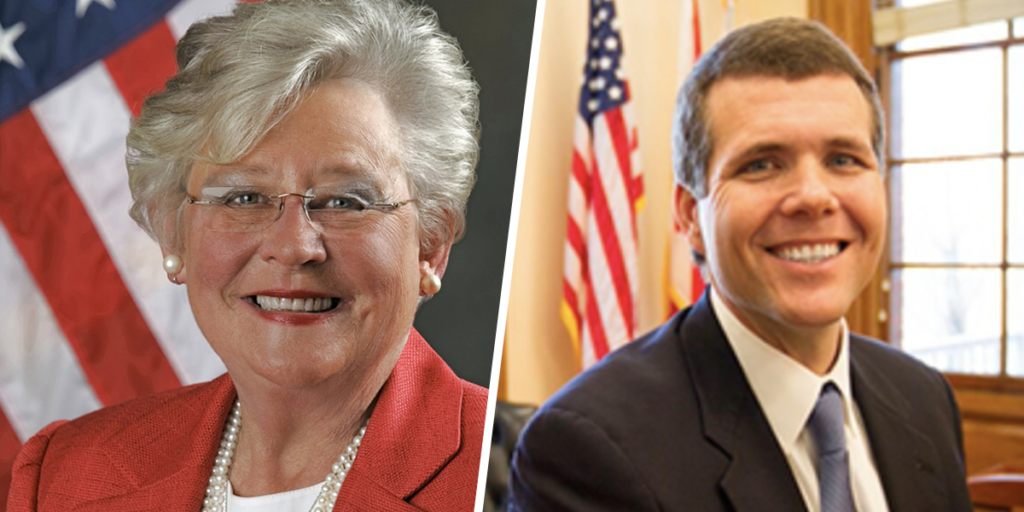
Governor Kay Ivey and Democratic gubernatorial candidate Walt Maddox both spoke at the Alabama Association of County Commissioners in Orange Beach on Wednesday, providing their views on a lottery in the state and the Ten Commandments Ballot measure on the ticket with them in the November 6 general election after their speeches. Ivey seems to believe the Ten Commandments ballot measure is a good thing.” Goodness knows we need to keep the good Lord and our God Almighty in the forefront of our lives (or) we’ll never succeed,” Ivey told AL.com. Maddox took a different stance saying he believes the measure is a political ploy. “Let’s make no mistake about this, it’s not about our values and our faith. It’s about a political ploy,” Maddox told AL.com. “It’s going to ultimately end up in us spending hundreds of thousands of taxpayers’ money.” “We have so many issues affecting everyday Alabamians and I think that is where our focus needs to be. What the politicians need to focus on are the problems in front of them,” he continued. Both candidates however, seem to agree on a lottery for the state. “If the people want to vote that’s fine,” Ivey told WKRG. “We have a robust economy, our budgets are strong we are able to do what we need to do so Alabama is at work and we’re working hard and is working.” Maddox, who unveiled his education lottery plan in February, stood by his previous stance. “The lottery has been a part of our platform since the very beginning and we certainly believe that 300 million dollars a year should be invested in college scholarships, Pre-K programs and to our schools so we can lift everyone up in the state of Alabama,” Maddox also told WKRG.
Checking in: What has Huntsville Mayor Tommy Battle been up to?
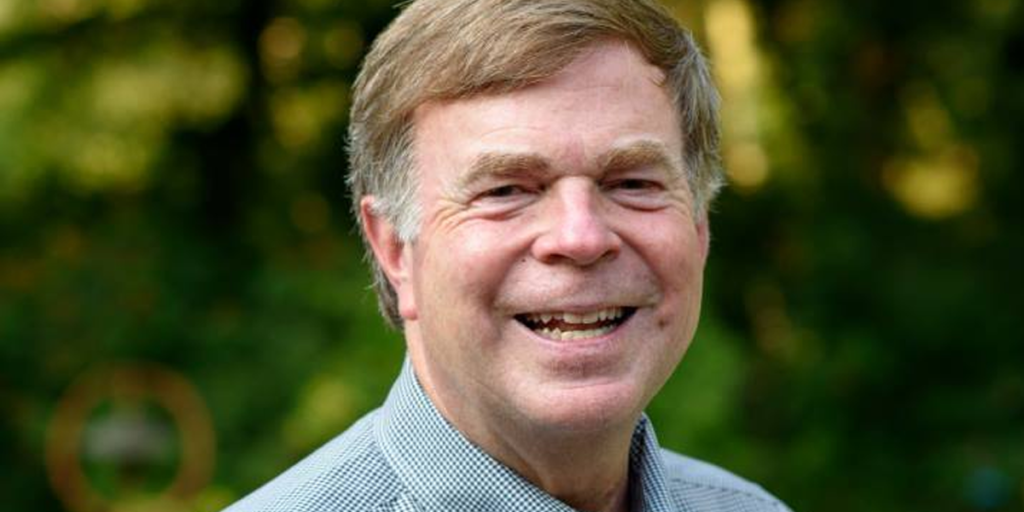
Ever wonder what your mayor been up to each month? Sure you may have helped elect them, but what happens after that? Alabama Today has you covered. Each month we’ll highlight what the Yellowhammer State’s Big 5 mayors have been doing in an effort to hold them accountable and keep things more transparent. From celebrating the 50 anniversary of the launch that took man to the moon, to writing a blog post on why Huntsville should be the home of the new U.S. Space Force — Huntsville Mayor Tommy Battle has had one busy month. Here’s what he’s been up to for the last month: July 17 Battle joined U.S. Space and Rocket Center CEO Dr. Deborah Barnhart in announcing several events to commemorate the 50 anniversary of the launch that took Man to the Moon. July 18 Battle attended the ribbon cutting for Woodbridge Alabama, celebrating the creation of new jobs. Woodbridge Alabama is a Plastics, and Special Equipment Manufacturer in Huntsville, Ala. July 20 Battle published a blog post on the city’s blog, on why Huntsville should be the new home of the U.S. Space Force. “The Trump administration recently challenged the Department of Defense to stand up a branch of the Armed Forces to protect space as a national security priority,” Battle wrote. “I believe Huntsville is the answer to that challenge,” he continued. “As the space environment becomes even more complex, and the risks involved in losing critical assets in space continue to increase, there is no place better equipped than Huntsville to grow space leaders and solutions for a new U.S. Space Force.” July 25 In anticipation of the beginning of the school year, Battle met with principal of McNair Junior High School, Dr.Carlita Collins. “We have great leaders in our schools. Good luck this year,” Battle posted on Facebook. July 27 Battle recognized amateur boxer Obed“RADAR”Bartee II for winning the National Junior Olympics, giving him a Certificate of Commendation from the City of Huntsville. July 30 Battle joined the Huntsville Police Department in honoring three officers who saved every resident and pet from a burning apartment building earlier in the year. July 31 Joined by Governor Kay Ivey, Battle announced the opening of South Memorial Parkway to traffic. “After two and a half years of expedited construction, the main line overpasses on South Memorial Parkway are now open to motorists,” Battle’s weekly update read. “The project was made possible through Restore Our Roads, a $250 million cost-sharing package for eight major state road projects in Huntsville with the Alabama Department of Transportation.” He then presented Ivey with a special token of appreciation, “for the partnership between the City and the State to make this project and many more possible,” he posted on Facebook. August 1 The city of Huntsville announced a music ecosystem survey to gather additional public input for a citywide music audit, aimed at musicians and music industry stakeholders to learn more about what the public thinks about Huntsville becoming a music-rich city. “We have an amazing opportunity here, to figure this out and direct our future as a music city,” Battle said in a Press Release. “If we do this right, and the public participates, we can develop a vibrant and healthy music ecosystem that will generate social, cultural and economic benefits.” August 2 Battle journeyed to the White House to meet with Cabinet Officials as part of an Alabama elected leaders visit. August 7 Battle attended the annual Space and Missile Defense (SMD) Symposium, the leading educational, professional development and networking event in the space and missile defense community to meet with industry and military leaders. August 16 Battle presented NASA Administrator James Bridenstine a coin from the city of Huntsville to honor his visit to Huntsville and the Marshall Space Flight Center.
Alabama has a lot at stake in the 2020 Census, here’s how it’s preparing

Alabama has a lot at stake in the 2020 U.S. Census — from a seat in the U.S. House of Representative to a vote in the Electoral College, as well as federal funds — depending on participation levels and what the results indicate. Which is why, Gov. Kay Ivey on Monday signed an executive order establishing a state-level committee designed to prepare Alabama for maximum participation in the 2020 U.S. Census. The Alabama Counts! 2020 Census Committee Ivey established the Alabama Counts! 2020 Census Committee that will serve as an advisory group made up of public and private statewide organizations to recommend and implement strategies for raising awareness of the 2020 census. As mandated by the Constitution, the U.S. Census Bureau conducts a count of the United States population every 10 years. Starting April 1, 2020, each Alabama household should receive a postcard from the Census Bureau encouraging them to complete their census form online or by phone or to call a number to request a paper form. The Alabama Department of Economic and Community Affairs serves as the state’s liaison to the U.S. Census Bureau. Governor Ivey named ADECA Director Kenneth Boswell as chair of the Alabama Counts! 2020 Census Committee. The committee will be divided into subcommittees designed to reach all areas of Alabama. Those subcommittees are: Government, Education, Faith-based Groups, Community-based Groups, Economic Development/Industry, Health Care, Rural and Outreach. Executive Order 715 tasks the committee with developing a Census Action Plan by Aug. 1, 2019 and taking steps to implement the plan leading up to April 2020. “Governor Ivey and I understand how critical it is that we do everything in our power to ensure Alabamians are ready to be counted in the 2020 Census,” Director Boswell said. “This committee and its subcommittees will bring some of the best and brightest from all sectors of Alabama together to help the state over the next year and a half.” The subcommittee chairs will serve as the group’s executive committee and will work with ADECA and the Governor’s Office over the next several weeks to form membership of their subcommittees. The executive committee and its subcommittees will meet regularly in the coming months to develop and implement outreach and education plans targeted to all aspects of Alabama. The committee and ADECA also will work closely with Alabama’s two partnership specialists from the Census Bureau. The following people will serve as subcommittee chairs: GovernmentU.S. Rep. Robert Aderholt/Paul Housel, District Director for Rep. Aderholt Education: Eric Mackey, Superintendent of Alabama Department of Education and Jimmy Baker, Chancellor of Alabama Community College System Faith-based Groups: Bishop Kyle Searcy, Lead Pastor of Fresh Anointing House of Worship in Montgomery and Rev. Jay Wolf, Senior Pastor of First Baptist Church Montgomery Community-based Groups: Ron Gilbert, Executive Director of Community Action Association of Alabama Economic Development/Industry: Steve Spencer, President of Economic Development Partnership of Alabama Health Care: Dr. Scott Harris, State Health Officer at Alabama Department of Public Health Rural: Paul Pinyan, Executive Director of Alabama Farmers Federation Outreach: Kenneth Boswell, ADECA Director and Chair of the Alabama Counts 2020 Census Committee Federal funds A recent study by George Washington University indicates the U.S. government returned more than $1,567 to the state in 2015 for every Alabamian counted in the census. More than 100 federal programs use data collected during census counts as part of their formulas to distribute billions of dollars in federal funding to the states. Those programs include Medicaid, Medicare Part B, Supplemental Nutrition Assistance Program, Highway Planning and Construction, and Title 1 Grants to Local Education Agencies. Census-derived data also is used to allocate seats in the U.S. House of Representatives and in legislative redistricting. “The stakes are high for Alabama in the 2020 U.S. Census, and our success depends greatly on our ability to help Alabamians understand the importance of completing and submitting their census forms,” Ivey said. “For that reason, I am forming this committee a full 20 months before the April 1, 2020 census count to bring leaders of many statewide public and private groups together to ensure every Alabamian knows the importance of doing their part and participating in the census. When we all do our duty, we ensure that the state gets our fair share of funding for dozens of critical programs and ensure we maintain fair representation in Congress.” Preparing for the 2020 Census ADECA has worked for the past year to help Alabama’s counties and municipalities update the address lists that will be used by the Census Bureau in 2020 to account for new development and other changes. Participation in the process for 2020, known as the Local Update of Census Addresses, more than doubled from 2010. In total, 280 Alabama municipalities and 58 counties are registered to participate in the update process. That represents a 104 percent increase in municipalities and a 128 percent increase in counties over 2010 in which 137 municipalities and 25 counties registered to participate. ADECA has established a page on its website with information about the upcoming census that will be updated as the Alabama Counts 2020 Census Committee gets up and running. The page is available at www.adeca.alabama.gov/census.
Kay Ivey acts to stop sheriffs from pocketing state jail food money

In two memos sent last Month, Alabama Gov. Kay Ivey announced Alabama sheriffs may no longer personally profit from a very small portion of jail food funds: those state funds allocated for services in preparing and serving food to people in their jails. “Public funds should be used for public purposes – it’s that simple,” Ivey had said in a statement. Yet, some advocacy groups pointed out the fact that contrary to what many believe, the memos did not yet fully fix the problem of sheriffs personally pocketing these public funds. Which is why on Friday Ivey took additional steps to end the controversial practice. Effective Sept. 1, Alabama county sheriffs must sign an affidavit to receive state funds that will now include and “oath” and stipulate the funds will only be spent on “food for prisoners in the county jail” and “preparing food, serving food and other service incident to the feeding of prisoners.” The previous version of the affidavit failed to include such specific details. “Public funds should be used for public purposes. I issued the memo to the State Comptroller in July to ensure that the public funds available for inmate food and food service are used for only that,” Ivey said Friday in a statement. She continued, “The new affidavit issued by the State Comptroller’s office is the implementation of that memo and makes it clear that sheriffs are to use the funds only in their official capacity.” “Thank you @GovernorKayIvey for telling the sheriffs that public $ is for public services, not personal profit!” tweeted Alabama Appleseed — a non-profit, non-partisan organization whose mission is to work to achieve justice and equity for all Alabamians — who previously pointed out Ivey’s original memo would not correct the issue at hand.
Walt Maddox capitalizes on Kay Ivey’s debate absence in new video series
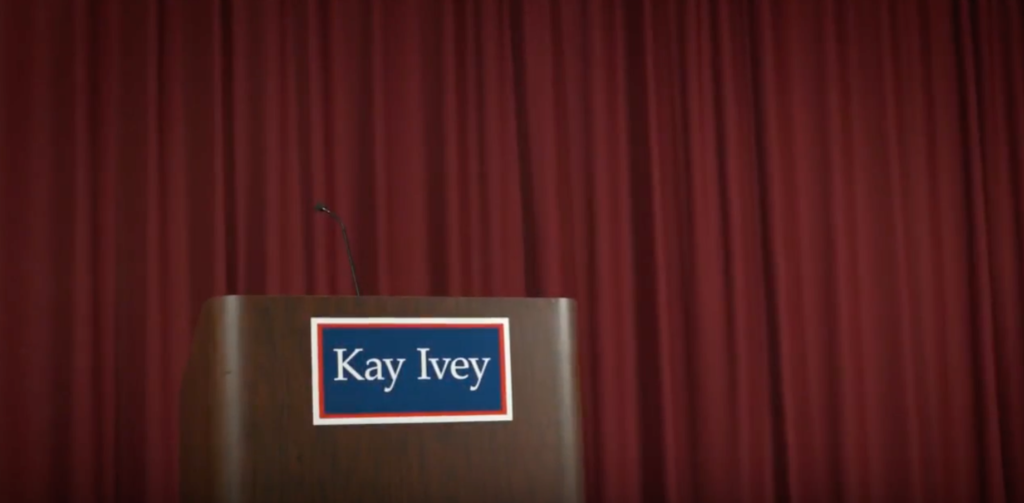
Democratic gubernatorial candidate Walt Maddox is capitalizing on Kay Ivey‘s dismissal of his calls to debate in a new video series his campaign has released on YouTube. Thus far, two video have been released. In the first video, an announcer addresses an empty debate podium labelled “Kay Ivey,” asking wether or not she stands by her position of Maddox being inconsistent and non-committal on several issues including abortion, gun control, and confirming Brett Kavanaugh as a new Supreme Court Justice. The empty podium never answers; leaving the announcer to ask “Governor Ivey? Governor?” Maddox then responds to the question himself, securing his positions on all issues. “I am a pro-life democrat,” Maddox says in the video. “Being pro-life means that we must also invest in our healthcare and education systems.” “I believe in the second amendment, and like most Alabamians I believe in universal background checks,” Maddox continues. “And when it comes to Judge Kavanaugh, lets let the United States Senate do their job. Lets trust in Doug Jones and Richard Shelby to make the decision they were sworn to do.” In the second video, the same scene is set: empty podium with an announcer addressing a question to a missing Ivey. “Since stepping in to Governor Bentley’s unexpired term, you sided with those who oppose accepting billions of dollars in federal aid for healthcare expansion; if elected governor would you support the expansion of healthcare?” “Governor Ivey? Governor?” Maddox then answers the question himself, saying “Let me be clear; on day one I am going to expand Medicaid” “Because of failed leadership we have seen hospital after hospital close in Alabama,” Maddox continues. “Our failure to expand Medicaid has meant that this state has lost out on billions of dollars and over 30,000 new jobs…As your Governor I am going to take a leadership role in expanding Medicaid; improving our healthcare network so that all Alabamians can enjoy a higher quality of life.” Maddox has called Ivey to the debate stage several times, and each time she’s dismissed his proposals saying; “When he finishes debating himself he can talk.” Ivey has yet to say whether or not she will debate Maddox ahead of the Nov. 6 general election.
Kay Ivey reports successful first year for Strong Start, Strong Finish education initiative

Alabama’s Strong Start, Strong Finish (SSSF) education initiative is off to a strong start, Gov. Kay Ivey reported Monday providing a one-year progress report on the initiative she announced on July 26, 2017. The program, which endeavors to integrate Alabama’s early childhood education, K-12 education and workforce development efforts into a seamless educational journey, is composed of three major strategies: Pre through Three; Computer Science for Alabama (CS4AL); and Advanced Training, Better Jobs. According to the Governor’s office, o the past year Ivey has secured progress toward each of the SSSF goals in the following ways: Pre through Three First Class Pre-K Program and the P-3 Pilot Under Ivey’s leadership, investment in First Class Pre-K has grown from $77.5 to $96 million in just one year. The $18.5 million increase in 2018 was the largest ever single-year increase in program funding approved by the Legislature. Looking forward to the 2018-2019 school year, First Class Pre-K will officially break the 1,000 classroom mark with 1,040 classrooms serving 18,720 four-year-olds, which will reach 35 percent of the eligible four-year-old population. In December 2017, Ivey announced Alabama was awarded a $1.5 million grant from the W.K. Kellogg Foundation to support the launch of the Pre-K-3rd Grade Integrated Approach to Early Learning pilot program (“P-3”), starting with 35 classrooms in 2017-2018. The program will grow to 75 classrooms in the upcoming 2018-2019 school year. The Alabama Campaign for Grade-Level Reading Ivey empaneled a diverse, 100-member Executive Team to assist in establishing 11 regional councils that will recruit a host of local campaigns for grade-level reading. The Executive Team met for the first time in June 2018, and the team will begin establishing the regional councils and recruiting local campaigns during the fall of 2018. In the 2018 Legislative Session, Ivey secured a $4 million increase for the Alabama Reading Initiative (ARI), which will be used to refocus ARI on grades K-3 and to reinforce the gains produced by the First Class Pre-K program. During Summer 2018, Ivey established the Alabama Summer Achievement Program (ASAP) for students who are reading below grade level proficiency in grades 1-3 in effort to prevent the backsliding that often occurs over the summer for children in low-income families. An ASAP pilot program was launched at four elementary schools in Montgomery County, serving hundreds of children, with plans for expansion in Summer 2019. Computer Science for Alabama (CS4AL) In 2016, only 86 schools in Alabama offered a high-quality computer science course. Today, more than 175 Alabama high schools offer such classes. In September 2017, Ivey established the Governor’s Advisory Council for Computer Science Education. In March 2018, Ivey and the Alabama State Board of Education approved the Alabama Digital Literacy and Computer Science Course of Study and Standards. Currently, only 10 other states in the nation have computer science standards. Ivey also worked to secure $300,000 for computer science professional development for middle and high school teachers, during the 2018 Legislative Session. On April 2, 2018, Ivey championed and signed legislation creating the Alabama School of Cyber Technology and Engineering. Based in Huntsville and scheduled to open during the fall of 2020, the school will be a destination magnet school that will also serve as the hub for computer science professional development in Alabama. Advanced Training, Better Jobs Alabama Postsecondary Education Attainment Goal On April 30, 2018, the Attainment Committee issued the Success Plus Plan for post-secondary attainment. Based on those recommendations, Ivey set the statewide post-secondary attainment goal of adding 500,000 highly-skilled Alabamians to the workforce by 2025. To achieve that goal, and in light of the recent reauthorization of Carl D. Perkins Career and Technical Education Act, Ivey is working to increase the efficiency of our workforce development programs to meet Alabama’s growing economic demands and to incentivize more private-sector partners to offer apprenticeships. Jobs for Alabama’s Graduates (JAG) Expansion The Jobs for Alabama’s Graduates (JAG) program has grown from 23 to 29 programs in 2018 alone. Ivey worked to secure a $250,000 increase in the state appropriation for JAG, which provided funds for four new programs in Tuscaloosa, Morgan County, Madison County and Wilcox County. Ivey also utilized federal Workforce Innovation and Opportunity Act (WIOA) monies to establish two additional JAG programs in Geneva County and Montgomery County. Ivey is happy with the progress thus far but plans to further work toward these goals and continue to strive for improvement in Alabama’s education system.
Checking in: What has Mobile Mayor Sandy Stimpson been up to?
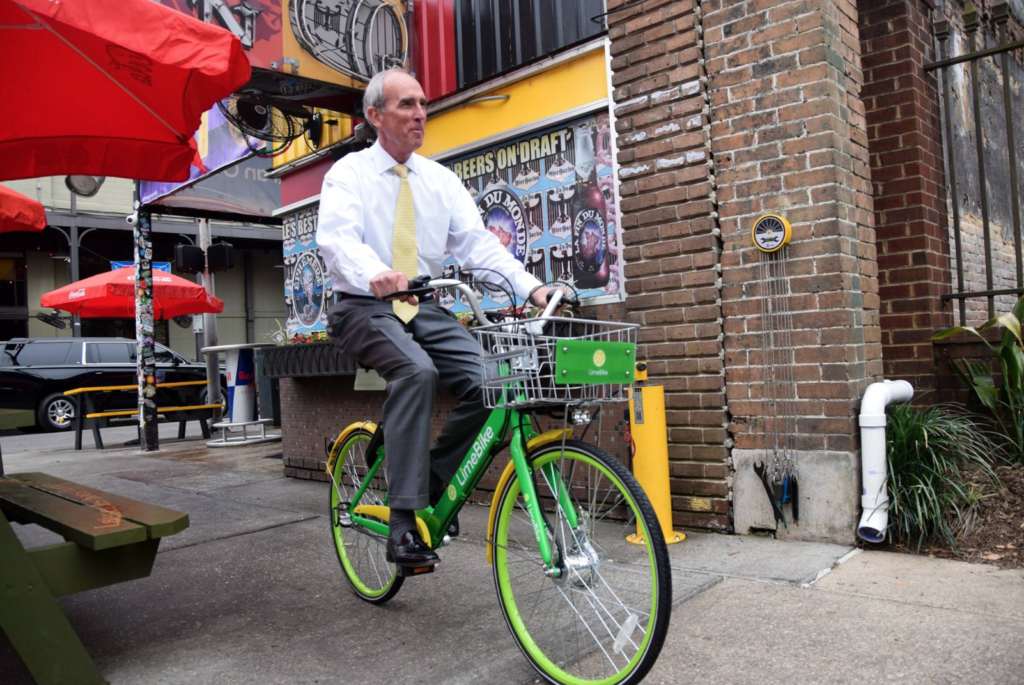
Ever wonder what your mayor been up to each month? Sure you may have helped elect them, but what happens after that? Alabama Today has you covered. Each month we’ll highlight what the Yellowhammer State’s Big 5 mayors have been doing in an effort to hold them accountable and keep things more transparent. In the last month, Mobile, Ala. Mayor Sandy Stimpson has implemented several changes to the city, traveled to the United Kingdom on behalf of his constituents, and announced the launch of the city’s first bike sharing program among other things. Here’s what he’s been up to for the last month: July 12 The city of Mobile enhanced Three Mile Creek Trail; adding picnic tables, fitness zones, pet stations, and several other amenities. “These new amenities will encourage fitness, support recreation and educate our citizens on one of our most precious waterways,” Stimpson said in a press release. “Our goal is to link neighborhoods, businesses and residents across Mobile. Within a mile radius of this segment alone, there are 69,000 residents, 900 businesses and 3 hospitals. Three Mile Creek was once Mobile’s drinking water source before World War II, and now it can once again connect communities throughout the City of Mobile.” July 15 – 17 Stimpson attended the Farnborough International Air Show in London meeting with Governor Kay Ivey, and several airplane manufacturers about expanding in Mobile. “Our strategy this week is all about jobs! Our momentum is surging with Airbus and Bombardier expanding at Brookley,” Stimpson posted to his Facebook page. “We have a busy week of meetings and businesses are eager to learn more about Mobile.” July 23 Stimpson attended and spoke at a community meeting at Williamson High School on the Ladd Peebles Stadium. July 25 Stimpson spoke to the Mobile City Council about the Ladd Peebles Stadium, addressing the comments of the community to the council. “For years, the problems at Ladd Stadium have been kicked down the road for someone else to handle. It’s time for that to change,” Stimpson posted on his Facebook page. July 30 Stimpson announced the launch date of Mobile’s first bike sharing program, Limebike. “In a statement, Stimpson called for Mobilians to help make the bike share program a success,” the Associated Press reported. “He asked motorists to give cyclists plenty of room, and asked cyclists not to park their bikes in places that block vehicular or pedestrian traffic.” August 4 Stimpson hosted the fourth annual Mayors Cup, a full day of football, soccer, and track events for young people in the community. “I am extremely excited to welcome back the Mayor’s Cup this year. I look forward to seeing the local community come together for a fun day outdoors and enjoy one of our beautiful parks in the City of Mobile,” Stimpson said in a statement. “This event teaches our young people the important values of teamwork and sportsmanship. May the best man or woman win!”


